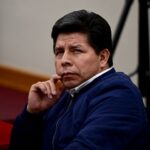
A court in Peru has sentenced former President Pedro Castillo to 11 years, five months and 15 days in prison for seeking to dissolve Congress.
The decision on Thursday came nearly three years after Castillo sought to disband the legislature on December 7, 2022, as he faced a third set of impeachment hearings.
- list 1 of 3Peru jails ex-president Humala for 15 years over money laundering
- list 2 of 3Former Peruvian president imprisoned over corruption allegations
- list 3 of 3Peru’s Congress votes to remove President Boluarte as crime grips nation
end of list
The first two attempts to impeach Castillo had been unsuccessful. But after he appeared on television to impose a state of emergency and suspend the legislature for eroding the rule of law, Congress swiftly voted for his removal. He was arrested the same day.
Castillo, a former teacher and union leader, was charged with rebellion and conspiracy against the state for his alleged power grab, which some have described as a “self-coup”.
A left-leaning, socially conservative politician from Peru’s rural north, Castillo had faced up to 34 years in prison at his sentencing.
Prosecutors in the case argued that Castillo aimed to undermine Peru’s Constitution with his actions. But at trial last week, Castillo denied the charges against him. Addressing his televised 2022 speech, he said he merely read out “a document without consequence”.
Castillo is part of a series of presidents in recent decades to face investigations and criminal charges in Peru. The country has had eight presidents within the last 10 years alone.
After his surprise victory in the 2021 presidential election, Castillo, now 56, was dubbed the country’s first “president of the poor“, given his working-class roots in the northern city of Puna. He had never previously held elected office.
Advertisement
His brief tenure, which lasted only around 16 months, was defined by frequent shake-ups among his top ministers and clashes with the opposition-led Congress.
Castillo’s arrest in 2022 sparked pushback from Indigenous residents and his rural base, members of which blocked roads, particularly in Peru’s south.
The unrest fuelled widespread, years-long protests across the country. His successor, former Vice President Dina Boluarte, oversaw a brutal crackdown of those demonstrations that left at least 50 people dead.
The Inter-American Commission on Human Rights has accused the government of using “disproportionate, indiscriminate and lethal use of force” in its response to the protests.
Boluarte, the country’s first female president, was subsequently impeached in October, amid concerns about rising crime and investigations into her behaviour. She has been replaced by the right-wing politician Jose Jeri, who previously was the head of Peru’s Congress.
Thursday’s sentencing caps a nine-month trial punctuated by a diplomatic rift.
During the court proceedings, the Mexican embassy granted asylum to Castillo’s former prime minister, Betssy Chavel, who was also facing charges related to the former president’s effort to consolidate power.
Peru’s government subsequently labelled Mexican President Claudia Sheinbaum, a vocal supporter of Castillo, “persona non grata”.
Castillo has been denied the possibility of serving his sentence under house arrest. Instead, he is slated to join several other former presidents at Barbadillo Prison in the capital Lima. The prison, situated at a police academy, was set up to hold convicted leaders who might face safety hazards in other detention facilities.
Detainees at Barbadillo include Ollanta Humala, who served as president from 2011 to 2016 and was sentenced to 15 years in prison this year for money laundering.
Alejandro Toledo, who served from 2001 to 2006, was sentenced last year to 20 years in prison for taking bribes. He too is at the prison.
And Martin Vizcarra, who was sentenced on Wednesday to 14 years in prison for bribery, was transferred there this week.
British Caribbean News


